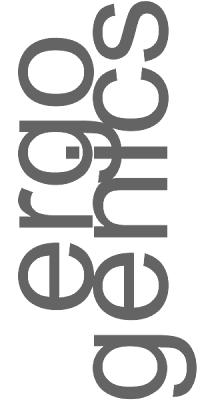 |
|
MRI legt antikatabole werking van curcumine vast
Curcumine is een interessante stof voor sporters die zo intensief trainen dat hun lichaam moeite heeft om hun spieren te laten herstellen. Als je ons niet op onze blauwe ogen gelooft, dan moet je even in het archief kijken. Een probleem is dat het lichaam curcumine slecht opneemt. Maar volgens onderzoekers van het Spaanse Olympic Training Centre kun je dat probleem omzeilen als je een novel curcumin delivery system gebruikt. En gelukkig is dat novel curcumin delivery system helemaal niet zo novel. Het is al jaren op de markt.
Tataa
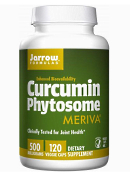 |
Soortgelijke bolletjes ontstaan ook als je een complete maaltijd - met vetten - verteert. In welke vorm je curcumine ook gebruikt, de opname is waarschijnlijk beter tijdens een complete maaltijd.
Studie
De onderzoekers gaven 10 proefpersonen gedurende 4 dagen elke dag 1 gram Meriva [2 capsules] bij het ontbijt, en diezelfde dosis nog-es bij het avondeten. Een even grote groep kreeg een placebo. De proefpersonen waren trouwens redelijk actieve mannen.
Halverwege de suppletieperiode lieten de onderzoekers de mannen op een treadmill 45 minuten helling-af rennen. Dat is een perfecte manier om spiervezels flink te belasten, en een fikse spierpijn te krijgen.
Twee dagen na de test bepaalden de onderzoekers met MRI in de beenspieren van de mannen de mate van spierschade. Die schade was minder bij de mannen die curcumine hadden gebruikt.
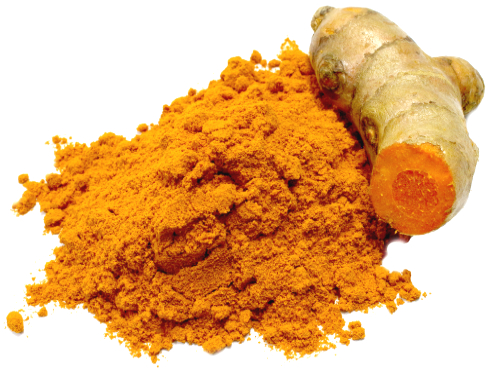
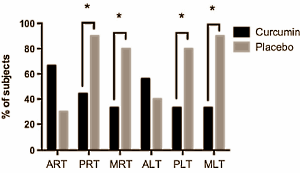
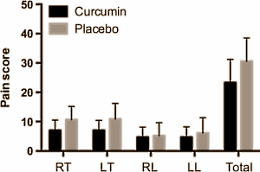
De mannen die curcumine hadden gebruikt, rapporteerden minder spierpijn - maar het verschil met de placebogebruikers was niet significant.
RT = right thigh; LT = left thigh; RK = right leg; LL= left leg; Total = total pain score.
Remt curcumine spiergroei?
"These findings suggest that curcumin might be beneficial in the prevention of delayed onset muscle soreness", schrijven de onderzoekers. "However, one might argue that, being a mild inhibitor of cyclooxygenase 1/2 (COX1/2), curcumin may interfere with muscle growth."
"In fact, the detrimental effects of non-steroidal antinflammatory drugs (NSAIDs), which are known inhibitors of COXs, are an important point of concern. This effect is mediated by the inhibition of COXs, and COX2 in particular, and seems typical of all agents active on these pro-inflammatory end-points."
"Curcumin is a poor inhibitor of COX1/2, and its effects on the production of prostaglandins are essentially due to the inhibition of the (mPGES)-1, the inducible form of the ultimate enzyme involved in the generation of the single specific prostaglandin PGE2. Inhibition of (mPGES)-1 has not been related to interference with muscle growth, that seemingly results from the global depletion of prostanoids associated to the inhibition of uphill enzymes involved in their generation, like COXs."
Bron:
J Int Soc Sports Nutr. 2014 Jun 18;11:31.
Meer:
Combinatie visolie en curcumine activeert anabolisme in inactieve spieren (10-4-2019)
Meer spieren op hoge leeftijd dankzij curcumine (11-3-2019)
Curcumine versterkt het effect van hardlopen op de spiercel (8-1-2018)
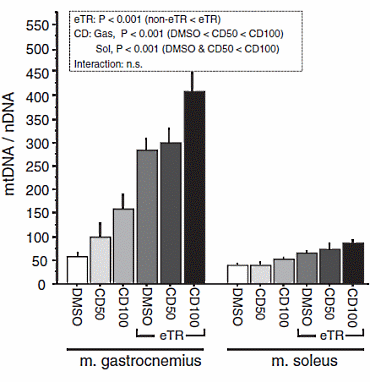 |
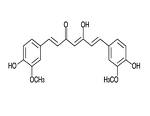 |
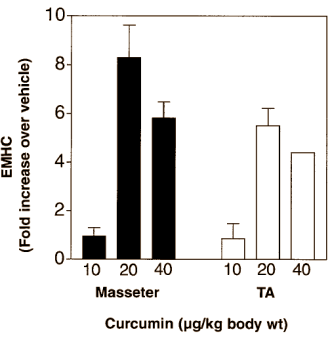 |
Forse dosis curcumine versterkt het effect van training op spieren Sporters die hun uithoudingsvermogen willen vergroten, boeken misschien betere resultaten als ze hoge doses curcumine gebruiken. |
Curcuminesuppletie: meer glycogeen, minder melkzuur, meer uithoudingsvermogen, meer spierkracht Suppletie met curcumine is misschien ook interessant voor duursporters. |
Beschadigde spieren herstellen sneller door curcumine Volgens een dierstudie van Emory University uit 1999 versnelt curcumine het spierherstel met maar liefst een factor vijf. |